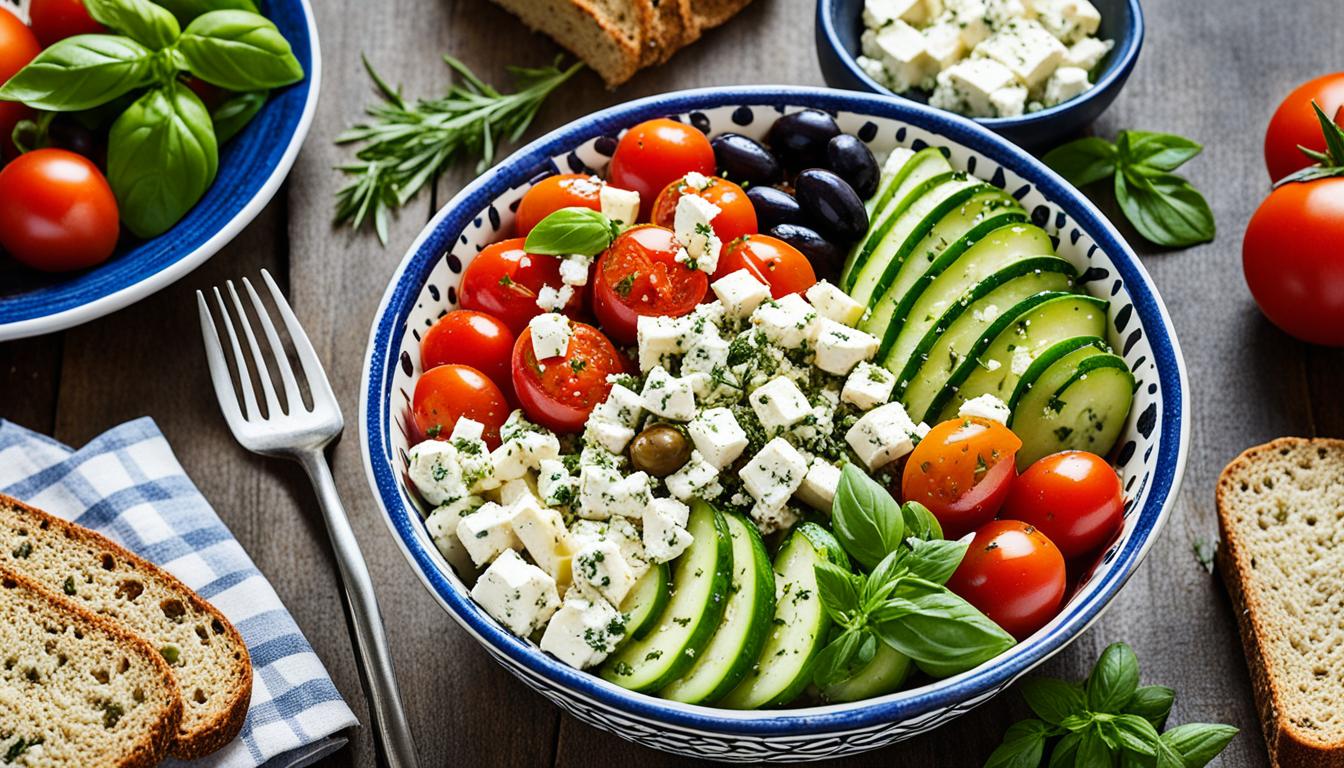Ever wanted a diet that is both healthy and tasty? The Mediterranean diet does just that. It has changed my life, making it easy to meet my health goals while enjoying my meals.
Imagine eating delicious, homemade food that’s also good for you. That’s what the Mediterranean diet offers. It mixes great taste, nutrition, and culture into one. The 30-day plan gives you all you need for a healthier lifestyle, with a focus on fruits, vegetables, fats, and proteins.
This guide has over 40 delicious recipes, a balanced 4-week meal plan, and meal prep tips. It’s perfect for anyone starting or refreshing their Mediterranean diet journey. It provides everything to start your path to better health and happiness.
Key Takeaways:
- Indulge in a flavorful and sustainable approach to healthy eating with the Mediterranean diet.
- Experience the benefits of nourishing your body with fresh, whole foods.
- Discover a 30-day meal plan that supports weight loss and promotes overall well-being.
- Learn how to incorporate meal planning, portion control, and mindful eating into your daily routine.
- Unlock a world of delicious and nutritious recipes that embody the essence of the Mediterranean lifestyle.
Introduction to the Mediterranean Diet
The Mediterranean diet is famous for its many health benefits. It’s not just a diet, but a way of life. It helps you live a healthy and long life by eating well every day.
This diet focuses on eating fresh, whole foods. You’ll eat lots of fruits, vegetables, grains, beans, nuts, and use olive oil. These foods are packed with vitamins, minerals, and antioxidants for good health.
One big plus of this diet is how it helps your heart. Studies show it lowers your risk of heart disease. This is because it uses healthy fats from olive oil and fish. These fats cut down bad cholesterol and inflammation.
The Mediterranean lifestyle also encourages enjoying your food. It tells you to take time with your meals and enjoy them with others. This way, you eat better and avoid eating too much without thinking.
To wrap up, this diet makes your heart health better. It also lowers your risk of diseases like diabetes and some cancers. By following this diet, you choose to look after your health. Plus, it makes eating a fun and rich experience.
Benefits of the Mediterranean Diet
The Mediterranean diet boosts heart health and aids in weight loss. It’s a balanced eating plan that improves well-being. It also cuts down chronic disease risks.
This diet is great for the heart. It lowers bad cholesterol and blood pressure. Plus, it reduces inflammation in the body.
It also helps avoid obesity and type 2 diabetes. By eating whole foods and less processed food, one can stay at a healthy weight. This diet promotes eating with awareness which helps in managing portions and supports weight goals.
Choosing the Mediterranean diet means enjoying tasty meals. It uses fresh ingredients and healthy fats like olive oil. These make meals delicious while keeping you healthy.
| Benefit | Description |
|---|---|
| Improved heart health | Reduced LDL cholesterol, lower blood pressure, and decreased inflammation |
| Lower risk of obesity | Emphasis on whole, nutrient-dense foods promotes healthy weight management |
| Reduced risk of type 2 diabetes | Focus on balanced meals and mindful eating supports blood sugar control |
Embracing the Mediterranean diet leads to better heart health and weight management. It’s a step towards improved overall wellness.
How to Follow the Mediterranean Diet
To start the Mediterranean diet, you should understand its guidelines, make a diet food list, and plan your meals right. These steps will help you enjoy the health perks of this diet. By doing so, your health and well-being will get a big boost.
Guidelines for the Mediterranean Diet
The Mediterranean diet is about eating lots of healthy foods. Here’s how you can stick to it:
- Emphasize fruits and vegetables: Load up on fruits and veggies like tomatoes, cucumbers, and berries. They’re packed with vitamins and antioxidants.
- Incorporate whole grains: Choose whole grains like quinoa and brown rice. They increase your fiber for better digestion.
- Include legumes, nuts, and seeds: Beans, lentils, almonds, and chia seeds are great. They offer healthy fats and are good protein sources.
- Choose lean proteins: Eat less red meat. Go for fish, chicken, or tofu instead for their healthy omega-3s.
- Utilize healthy fats: Use olive oil instead of butter. Avocados and olives are also rich in good fats.
- Season with herbs and spices: Flavor your food with herbs like basil and rosemary, not too much salt. It makes your food tastier and healthier.
Meal Planning: A Cornerstone of Success
Planning your meals is key to sticking to the Mediterranean diet. When you plan, you’ll always have healthy food ready.
Here are tips for good meal planning:
- Create a grocery list: Make sure you buy fruits, veggies, whole grains, and healthy fats. This way, you’ll have all you need for cooking.
- Prepare meals in advance: Cook your meals for the week in one go. This saves time and keeps you eating healthy.
- Focus on balanced meals: Your meals should have proteins, grains, and lots of veggies. This mix gives you all the nutrients you need.
- Experiment with recipes: Try different Mediterranean recipes. It keeps things interesting and helps you stick with the diet.
By following these Mediterranean diet tips and planning your meals, you’ll enjoy a healthy and tasty way of eating. It’s a powerful way to improve your health and feel great about your food choices.
| Food Group | Examples |
|---|---|
| Fruits | Apples, oranges, strawberries, grapes |
| Vegetables | Spinach, tomatoes, cucumbers, bell peppers |
| Whole Grains | Quinoa, whole wheat bread, brown rice |
| Legumes | Chickpeas, lentils, black beans |
| Nuts and Seeds | Almonds, walnuts, flaxseeds, chia seeds |
| Lean Proteins | Fish, chicken breast, tofu, Greek yogurt |
| Healthy Fats | Olive oil, avocados, olives |
| Herbs and Spices | Basil, oregano, rosemary, garlic, turmeric |
Sample 30-Day Meal Plan
Ready to start your Mediterranean diet journey? This 30-day meal plan is your guide. It offers a variety of breakfasts, lunches, dinners, and snacks. We’ve included recipes and tips to spark your kitchen creativity.
This plan focuses on portion control and providing around 1,200 calories daily. Enjoy a mix of fruits, vegetables, grains, lean proteins, and healthy fats. This balance is key to nourishing your body and enjoying your meals.
The Mediterranean diet emphasizes whole, nutrient-rich foods. Prepare for the delicious taste of seasonal produce, olive oil’s health benefits, and the unique flavors of herbs and spices.
Sample Day of the 30-Day Mediterranean Meal Plan
Here’s what a day on this plan looks like:
Breakfast:
- Mediterranean omelette with tomatoes, spinach, and feta
- Whole wheat toast with a drizzle of extra virgin olive oil
- Freshly squeezed orange juice
Lunch:
- Greek salad with mixed greens, cucumbers, tomatoes, Kalamata olives, and feta cheese
- Grilled chicken breast with lemon and oregano
- Whole wheat pita bread
Snack:
- A few almonds
- Sliced bell peppers with hummus
Dinner:
- Baked salmon with lemon and dill
- Quinoa pilaf with roasted veggies
- Steamed broccoli
Snack:
- Greek yogurt with fresh berries
This is just a sample of the tasty meals you can have. Feel free to change recipes or the plan to fit your needs. Being flexible helps you stick with it longer!
So, are you ready to try this 30-day Mediterranean meal plan? Let’s begin your journey to a healthier lifestyle!
Meal Prep and Kitchen Essentials
Meal prep is key to sticking to the Mediterranean diet. It involves preparing ingredients ahead of time. This way, you’ll always have healthy options ready. Spending time each week on meal prep helps you avoid unhealthy snacks.
Suggested Grocery List
Keep these Mediterranean diet staples ready for your meal prep:
- Fresh fruits and vegetables, such as tomatoes, cucumbers, spinach, and oranges
- Whole grains, like quinoa, brown rice, and whole wheat bread
- Legumes, including chickpeas, lentils, and black beans
- Lean proteins, such as chicken breast, fish, and tofu
- Healthy fats, like olive oil, avocados, and nuts
- Greek yogurt and low-fat cheese
- Herbs and spices, such as basil, oregano, and garlic
With these items, you can easily make healthy meals any day of the week.
Tips for Successful Meal Prep
Follow these tips for efficient meal prep:
- Plan your meals, including breakfast, lunch, dinner, and snacks.
- Choose recipes with similar ingredients to make shopping and prep easier.
- Pre-cut your vegetables and keep them in airtight containers in the fridge.
- Cook large batches of grains and proteins for the whole week.
- Use quality food storage containers and labels to stay organized.
- Try multi-compartment containers to keep meal components separate.
These tips help save time and ensure you have tasty, nutritious meals.
Kitchen Essentials
To ease meal prep and cooking, have the right tools. Here are crucial kitchen items for the Mediterranean diet:
- A sharp chef’s knife for cutting fruits, veggies, and proteins.
- A cutting board to protect your counters while cutting.
- Stainless steel pots and pans for various meals.
- A non-stick skillet for sautéing veggies and fish.
- A blender or food processor for smoothies, sauces, and dips.
- Measuring cups and spoons for accurate ingredient measurement.
- A set of mixing bowls for combining ingredients and salads.
Having these tools makes preparing Mediterranean meals easier and more fun.
With the right kitchen gear and some planning, making Mediterranean meals becomes simple and enjoyable.
Recipe Highlights
The Mediterranean diet is known for its tasty and healthy meals. Here, we show some top picks from our 30-day meal plan. These choices highlight the flavors and principles of the Mediterranean diet.
Grilled Salmon with Fresh Herbs
Enjoy a delicious grilled salmon topped with fresh herbs. This dish is full of omega-3 fatty acids and protein. It’s a healthy and filling meal. The smoky salmon and fragrant herbs make a mouthwatering combination.
Tabbouleh Salad
Try our Tabbouleh Salad for a burst of Mediterranean flavors. It’s made with parsley, tomatoes, cucumbers, and bulgur wheat. This salad is refreshing and packed with nutrients. A tangy dressing adds the perfect flavor twist.
Greek Yogurt with Fresh Berries
Enjoy a delightful dessert that’s also good for you. Our Greek Yogurt with Fresh Berries recipe is creamy and sweet. It’s a tasty, guilt-free treat. The berries and yogurt also boost your gut health with antioxidants and probiotics.
These recipes offer a glimpse into the delicious Mediterranean diet. The variety of flavors and nutritious ingredients make meals enjoyable. Your taste buds and health will thank you.
Recipe Highlights
| Recipe | Description |
|---|---|
| Grilled Salmon with Fresh Herbs | A flavorful and nutritious dish made with grilled salmon and an aromatic blend of fresh herbs. |
| Tabbouleh Salad | A refreshing salad featuring parsley, tomatoes, cucumbers, and bulgur wheat, tossed in a tangy dressing. |
| Greek Yogurt with Fresh Berries | A guilt-free dessert combining creamy Greek yogurt and antioxidant-rich fresh berries. |
These recipes showcase the best of the Mediterranean diet. You’ll find plenty of tasty and healthful options. It’s a great way to feed your body and delight your palate.
Portion Control and Mindful Eating
Portion control and mindful eating are key in the Mediterranean diet for a healthy lifestyle. These practices improve your food relationship. They help you choose wisely, supporting your well-being.
To add portion control and mindful eating to your diet, here are some tips:
1. Use Smaller Plates and Bowls
Smaller plates and bowls help you control how much you eat. Studies show smaller dishware makes portions look bigger. This trick makes you feel full with less food.
2. Measure Serving Sizes
Guessing portion sizes is hard. Use measuring cups or a food scale to prep meals. This keeps you on track with calories and portions.
3. Pay Attention to Hunger Cues
Mindful eating means noticing if you’re really hungry. Before seconds, ask yourself if it’s true hunger or just a habit. This stops extra calorie intake.
4. Slow Down and Savor Each Bite
The diet tells you to enjoy your food’s taste and feel. Eating slowly lets you enjoy your meal more. It helps you eat less.
5. Emphasize Nutrient-Dense Foods
Choose foods full of nutrients, like fruits and vegetables. These items fill you up with vitamins, minerals, and fiber. They’re good for your health.
6. Engage in Mindful Food Preparation
Focus when you cook, paying attention to the ingredients. This connects you more with what you eat. It makes meals more enjoyable.
“Mindful eating helps us connect with our bodies. It lets us enjoy the food we eat.”
Adding these practices to your diet improves your food relationship. They help you eat better and reach your health goals.
Frequently Asked Questions about the Mediterranean Diet
Curious about the Mediterranean diet? Here are answers to some common questions:
-
What is the Mediterranean diet?
The Mediterranean diet focuses on fresh, whole foods like fruits, veggies, whole grains, and nuts. It includes fish, poultry, and dairy in moderation. Red meats and processed foods are limited.
-
What are the benefits of the Mediterranean diet?
This diet lowers the risk of heart disease, diabetes, and some cancers. It helps with weight control and improves overall health.
-
What foods should I include in the Mediterranean diet?
Eat lots of fruits, vegetables, grains, legumes, nuts, and seeds. Have fish and seafood twice a week. Choose olive oil over butter. Use herbs and spices for flavor. Enjoy meals with loved ones.
-
Can the Mediterranean diet help with weight loss?
Yes, it supports healthy weight loss. It focuses on foods full of nutrients. Portion control helps you eat fewer calories while still enjoying tasty meals.
-
Is the Mediterranean diet suitable for vegetarians or vegans?
Absolutely! You can swap in plant proteins like legumes, tofu, and seitan. It’s easy to adapt for vegetarian and vegan diets.
-
Are there any potential downsides to the Mediterranean diet?
It’s safe for most people. But it’s smart to talk to a doctor or dietitian before making big dietary changes.
If you have any more questions about the Mediterranean diet, feel free to reach out to us. We’re here to help you on your journey to better health!
Tips for Long-Term Success
For lasting health benefits, sticking with the Mediterranean diet long-term is crucial. Sustainable lifestyle changes help you keep progress. Here are tips for long-term success:
1. Stay Physically Active
Regular exercise is vital for a healthy life. Adding activities like walking or cycling can maintain your weight and improve mood. Try to get at least 150 minutes of exercise every week.
2. Seek Support from Others
Starting a new diet can be tough, but you’re not alone. Look for support from friends or online groups. Discussing your journey helps with motivation and accountability.
3. Find Enjoyment in the Process
The Mediterranean diet combines nutrition with pleasure. Try new recipes and enjoy the food’s social aspect. Eating should be enjoyable, with focus on the meal and company.
4. Embrace Flexibility and Personalization
This diet is flexible and allows personalization. Feel free to adjust it according to your taste. It’s about finding a sustainable lifestyle that makes you happy.
“The Mediterranean diet is not a short-term fix. It’s about embracing a way of life that promotes well-being and longevity.” – Dr. Maria Rodriguez, nutrition expert
5. Set Realistic Goals
It’s important to set achievable goals. Celebrate small wins and aim for gradual improvement. Sustainable steps today lead to big changes later.
6. Continuously Educate Yourself
Keep learning about the Mediterranean diet. Read books and follow reputable sources. Knowledge helps you stay on track and make good choices.
7. Practice Mindful Eating
Mindful eating is part of this lifestyle. Eat slowly and listen to your hunger cues. Avoid eating with distractions for a better food relationship.
8. Stay Consistent
Being consistent is crucial for success. Follow your meal plan and keep active. Sustainable habits bring health improvements over time.
By following these tips, you can enjoy the Mediterranean diet’s long-term benefits and live healthier.
Additional Resources
Interested in the Mediterranean diet? There are many resources to help you. You can find guides, cookbooks, and websites full of info. They give tips, recipes, and support for your diet goals. Below are some top suggestions:
1. Mediterranean Diet Guide
This guide explains the Mediterranean diet’s principles and benefits. It has meal planning tips and ways to add the diet to your life. It’s great for anyone wanting to eat healthier.
2. Mediterranean Diet Books
- “The Mediterranean Diet Cookbook” by Mary Berry offers tasty recipes. It also covers the diet’s origins and benefits. It’s perfect for new and experienced cooks.
- “The Complete Mediterranean Cookbook” by America’s Test Kitchen features over 500 recipes. From starters to sweets, it includes shopping and cooking tips.
3. Mediterranean Diet Websites
Many trusted websites focus on the Mediterranean diet. They provide info, recipes, and tips. Here are a couple of picks:
- Oldways: The Mediterranean Diet gives resources like meal plans and cooking tips. It helps adapt the diet to fit various needs.
- Mayo Clinic: Mediterranean Diet covers the diet’s benefits and tips for following it. It also has many recipes to try.
Looking into these resources will deepen your knowledge of the Mediterranean diet. You’ll find many recipes and tips to help you live a healthier life.
Conclusion
The Mediterranean diet is more than just food; it’s a lifestyle for better health. By following this diet, you’ll enjoy many benefits. It can lower heart disease and diabetes risks while helping with weight loss.
Eating lots of fruits, veggies, whole grains, legumes, nuts, and healthy fats is crucial. Making smart food choices and eating fresh, whole foods are key. Plus, eating mindfully and with others makes your food relationship better.
Anyone can start a journey to better health with the Mediterranean diet. With the right tools and attitude, making lasting changes is possible. Start today and adopt this healthy eating style for a better, happier you.





